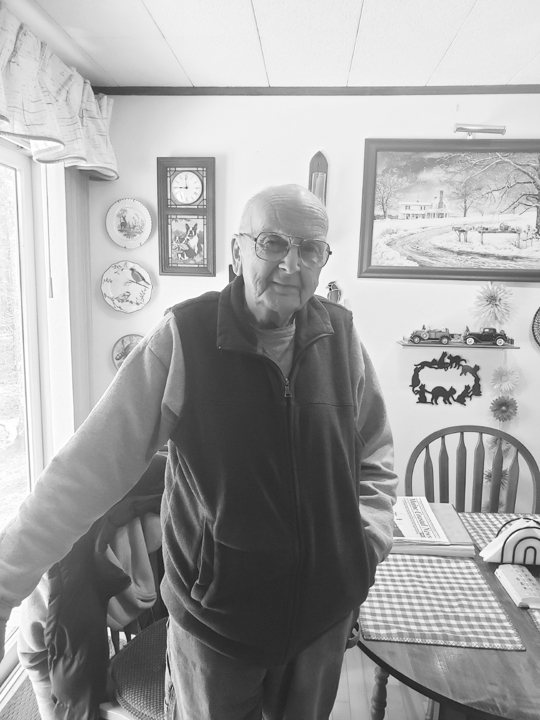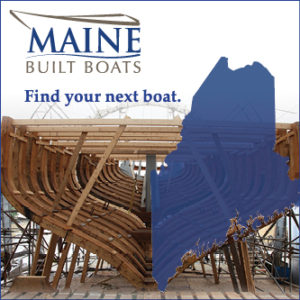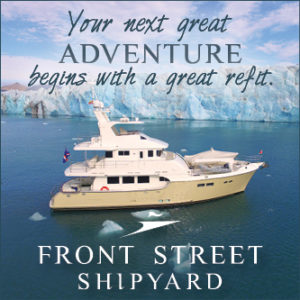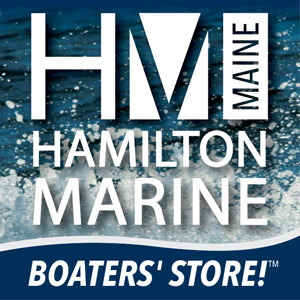
Robert Rice
EAST BOOTHBAY – At the launching of the 124-foot sloop ANTONISA from Hodgdon Yachts in East Boothbay in 1999 I started talking with a person there about East Boothbay and the Rice Brothers yard that had long since closed their doors. The person was Robert Rice, who was one of the descendants and had done a vast amount of work documenting the yard’s history. Knowing he had a vast knowledge of anything that happened in East Boothbay I made a few attempts to catch up with him, but our paths did not cross until this April and I am sorry that it was not sooner.
Robert began saying, “My great-grandfather had a house down at the end of School Street on the Damariscotta River. The basement had a set of ways where he went into building skiffs and dories. Frank being the oldest came along and went in with his father and Frank increased the size of the boats that they built. Then along came Will. The following year, which would be 1891, my grandfather went in with them. They built a building right next door, 140 feet long and 50 feet wide. They had another piece of land and they built a machine shop on it. My grandfather and Will were ambitious people and they wanted to go big. Frank was more settled, he was satisfied the way it was so in 1906 Will and Henry bought Frank out. Frank went next door because Rice Brothers owned that property and built on a small scale. Will and Henry of course increased the business both size-wise and money-wise. They built a lot of boats. In 1917 the shop burned and there was a lightship inside and that destroyed her. They cleaned up after the fire and built a big building, 200 feet long and 150 feet wide. There was an alleyway and there was another building, the same length but not the same width and that contained all the metal working equipment. The main building had all wooden working equipment. In 1946, Rice Brothers Corporation was Henry, my father Baxter, and his brothers, Carl and Donald. With the exception of Donald, the boys stayed right up to the end. Donald was killed in an automobile accident in 1951 in Wiscasset coming home from Brunswick, when a bus wandered over into his lane. There were two people with my uncle and both of them survived, but they were beat up pretty bad.
“When Rice Brothers went out of business in 1955,” continued Robert, “my uncle Carl retired, my father went to work for his cousin, Paul Luke and my grandfather passed on in 1959. Robert Rice is the last employee of Rice Brothers. I worked there for one year in 1954 and ’55 and there is no one else left that I know of that still living.
“I worked in the summertime,” said Robert, “two summers prior to that while I was going to school. I didn’t have to know anything, all I had to know was how to work a broom and I could do that pretty good. When I went to work there full-time in 1955, I got put on a boiler. They had a big boiler, it ran the kiln dry, the steam box and provided heat upstairs in the mould loft where fiberglass cabin tops were being built. That had to be a certain temperature all the time. It also ran the big steam crane down on the wharf. I worked on that three or four months and my cousin came back from the Army and he took over my job. That was his before he went in the service and I went to work with an old-time carpenter, old Joe Luke, Paul’s father. In ’54 we had a contract with the Navy for 11 personal boats. They were 40-footers and they were ship to shore, fairly decent looking boats. At the time the government was building their atomic carriers and eight out of the 11 boats that we built, four a piece, went on to the two atomic aircraft carriers. The rest of them sat in the storage yard at Newport News and after many years the government had an auction and one the boats was bought by a man in Michigan who found me. He was in process of restoring it and was doing a good job. They were all wood construction except, the cabin tops were fiberglass. For me they were a pain. I didn’t know anything, just a kid, 17, and what the hell does a 17 year old know?”
Robert was building hatch covers, and after awhile he knew what he was doing and they began giving him other woodworking projects. Robert said, “I got up one day and went to work and while I was working I stopped and I looked around at that stupid yard and I said, that is it. I am gone.”
He felt that the other workers did not want him around, felt he was in the way. When asked how his father took it, he explained, “I think he really understood because he went through the same thing himself only he stayed with it. When the yard closed in ’56 I think it bothered my father. He was kind of put in the middle of it. The only way to have saved the yard would have been to declare my grandfather incompetent. I am not sure you could have done that. My grandfather was pretty smart and knew what was going on. My father, and his brother Carl, did make an offer to buy the yard, but for whatever reason my grandfather said no. In 1959, after the yard had sat there for a long period of time, my cousin, Bernard Rice and John Gordon went into partnership and bought it. One main building towards the South Bristol side had been damaged during hurricane Edna and they tore that section down. They leased that building to Ed Gamage of South Bristol for a couple years. Fuller came in and rebuilt the main building in the mid-1960s. He did a lot of work down there. He put up-to-date machinery in there and built several draggers. Fuller raised hell with the other yards around here because he paid a better scale. One of Fuller’s big down falls was he hired people who knew less about boatbuilding than I did. Then he lost interest in it and he sold to Tiltson and they later sold it to Washburn & Doughty.”
Robert loves history and had done a lot of reading and wanted to see the places he had read about so he joined the U. S. Army after quitting his job at Rice Brothers. He did his basic training at Fort Dix, New Jersey and then it was off to Fort Belvoir, Virginia for advanced training. He said, “In the beginning and for most of my career I worked in procuring, with an exception of a tour in Vietnam. Then I got too much rank to be in the job and I became a first sergeant of a company in Europe where I was stationed at the time. The military was a good career for me. I came home from France after three years in 1959 on leave and the second day I was here I got out my little notebook, ran down the list of names that were either gone, married, or weren’t home and the last name in the book was June’s and she was home and she answered the phone. We got married in 1960. She’s done well to put up with me over the years, I give her credit. I am not the easiest person at times to live with.
“I liked the Army with the exception of the one-year tour in Vietnam” said Robert. “I was stationed at Long Binh the home base with the 196 Infantry Brigade. We were all over, all depends on what was going on at the time. It was a lost year and I never could make up that year. Of course my daughter (Kathy) was just born before I went to Vietnam so I missed out on a lot of things, but that is way it is.”
He then was stationed at Fort Devens and then it was back to Europe and Germany where he retired. His wife accompanied him on all the tours of duty except Vietnam. Together they traveled and saw a lot of Europe, but they were always happy to come home for leave. The only thing he regrets is not traveling on a barge through the European canal system. He has thought about going back, saying maybe for his 90th birthday.
When he retired from the Army in 1976 he came right back to East Boothbay and went to work as a maintenance foreman for Smuggler’s Cove Motel. He worked there six years and rebuilt a great deal of the Motel. Then he hooked up with a person he knew at Ocean Point who wanted him to help build a house together during the winter. Then Robert began working for himself repairing or building new houses in East Boothbay. Over the years he had a number of people work alongside of him for a number of years. He also had both of his grandsons work a number of years before going off on their own. The road Robert lives on he built all but one of the houses on it and the circle that his road comes off of he did a lot of work around it. He said, “I fully retired two years ago and I dropped a lot of cottages that I took care of prior to that. I don’t miss the work, but I miss the people It was a good job. I enjoyed doing it and if I had to do it over again, I would leave out Rice Brothers.”
When you visit Robert there is one thing that become obvious immediately, his love of making models. He said, “When I was about 12, the barber shop where my father would take me to get my hair cut, there was a handicap child in the harbor and he made a model of an airplane out of balsa wood. He put it up for auction in the barber shop, so I bought a ticket and a month or so after that when I was in the shop the barber went and got the model and give it to me and said, ‘You won it.’ That model fascinated me. I don’t know why, but it did. I said to my father ‘I would like to make a model, but I really don’t know how,’ My father said, ‘Well, we’ll get some wood together and he said I can’t make a plane but I can make a boat.’ He said ‘What would you like?’ I said ‘A PT boat.’ We built one 36 inches long and we built it together and I enjoyed that more than anything else and I never stopped.”
Robert has given a number of them away, just sold 125 models to a neighbor and there is still over 150 in the house. He figured that over the years he had built close to 500 models. “I built plastic, fiberglass, wood, kits, scratch built,” continued Robert. “If I saw something I liked I’d build it. I’d come home from work and after settling down, and the way the world was, crazy, I went right into my model room and closed the door and I was in a world of my own. I didn’t have to worry about any damn foolishness going on. I would stay in there for a couple hours every evening, that was my getaway. I am a slower paced now, but still not too many days go by that I don’t give it an hour or two so that is one of my pleasures.”
Where did the patience for model building come from? “I inherited that from my father,” said Robert. “My father was a stickler for detail. It had to be right and it had to look right. I suppose that also ties in with the building and the remodeling.”
What happened to the PT, “I will tell you a little story about my PT boat, explained Robert. “I had a skiff in the Mill Pond. We owned property around the Mill Pond and we had a boat down there, a little camp where the ladies changed into their bathing suits. My grandfather gave me 6-hp Elgin, a terrible motor, I’d crank on that damn thing and I’d be all the way across the pond before I could get it to go. I’d tell my father about it and he’d come down and he’d pull on it and she’d start right up. When I got that outboard I used to tow that PT boat behind the skiff. Probably the second or third time that I was going around the pond I opened her up and when I did, the PT boat did a nose dive and she filled up with water and I lost her. She is in the Mill Pond and so is the outboard!”
Continuing on with the story, he said, “There was a tide mill in the Mill Pond that my grandfather’s brother owned in later years. A section of it was logged off, the logs were tied together and tied to the shoreline on either side. Every now and then it was a great thrill to jump that log barrier. We’d get going wide open and hit that log and that boat would fly right up over. Well, one day I let my cousin use my boat and motor and he went down there to jump the logs and he didn’t get going fast enough and he got the motor hung up on the log and tore the stern out of the boat and the motor sank. He had quite a time to get ashore himself. I had a stern lesson from my father about lending my boats or anything to anybody. We rescued the boat and we rescued the stern. My father put it back together for us but no motor, didn’t even look for it.
“The Mill Pond is kind where I grew up,” added Robert. “We had a sailboat, canoe and rowboat. We spent a good many weekends down there. If you wanted to eat you had to go down to the Mill Pond because that was where my mother (Rita) was, she was a great swimmer. From the first day of May, no matter if it was snowing, she hit that Mill Pond and she’d swim across it. That was her thing.”
Rita was the oldest of 17 children, 14 boys and 3 girls. Robert explained she would tell you one time, second time around you better duck because she was a woman of few words. Her maiden name was Bridges and she was born and raised in Bath. “When she was 12 years old her mother and father moved down here to Boothbay,” said Robert. “and went to work for Frank Rice. Frank was Will Rice’s brother and Henry Rice’s brother who formed Rice Brothers Shipbuilding. They stayed here for four years before my grandfather moved to Portland. That is where my mother and father met. My father was Baxter Rice and my mother was 16 when she was married in 1927. My sister came along in ’28 and I in ’38.”
How are they related to the Lukes, Paul Luke’s mother was Robert’s grandfather’s sister, Elizabeth Luke, but known as Lizzy. When Robert was doing the family genealogy he found that her recorded name was Lizzy, not Elizabeth.
East Boothbay was the typical small Maine coastal town. The children entertained themselves with school plays, playing baseball, skating in the wintertime, and square dancing at the hall. Robert said, “The shipyards were all busy. Hodgdon Brothers and Goudy & Stevens were building minesweepers. The Rice Brothers were building lightships. Paul Luke was busy building his yachts and Frank Sample was building minesweepers. Rodney Reed was busy with pleasure boats. Everett Barlow, up on Barlow’s Hill, was busy in the wintertime building. I knew Earl (Barlow) better, Earl and I were modelers. Earl bought my grandfather’s house and he built a yacht called the ELSA. My father went up after work at night and helped him on certain things building it. He built it because he and his wife went to Europe and sailed all the canals. They were gone well over a year, maybe two and used to send a letter to the Boothbay Register and there would be a column in there every week on where they were and what they were doing.”
Like many who love their town they get involved somehow and Robert did this by assisting with the Boothbay Historical Society. He said, “46 years before I retired. The second year that Jim (Stevens) started that museum he called me one night and wanted to know if I had any interest in helping him set up the shipyards. Herb Douglas, who was the official photographer for the Navy as well as private, had two photo shops, one down here in the harbor, and one up in Bath where he lived. When he retired, he gave all his negatives and photos to the Bath museum and at that time my cousin was the curator. He called us and wanted us to come up there and go through them and take out anything that was associated with the Boothbay area. Jim and I spent three days up there going through that stuff, picture after picture, negative after negative. We had two big crates full. We brought them back and Jim said ‘I don’t know, we may have to take this stuff up to my house to work on it because we are going to close down the heating system here in the museum because we can’t afford to buy oil during the winter,’ I said ‘We have everything right here, that seems a shame to do that. Do you have any idea what it would cost? He said, ‘No,’ but he would find out. He did and I went half on it and he went half. We had a spare room upstairs and we put a tabletop on sawhorses and spread the stuff out. We spent all winter over there cataloguing all that stuff. Loved it.
“Jim was a nice man, continued Robert. “He was very smart. He could tell me things about my family that I never knew. He was always good to me and the only bad part about it was we done a lot of travelling together and he smoked those damn cigars. There isn’t anything any worse than sitting in a car, closed up in the wintertime with a person smoking a cigar.”
Jim lived on Barlow’s Hill in Robert’s great-grandmother’s house. They raised their family there and then purchased a farm on River Road in the 1970s.
So how did Goudy & Stephens start? Robert said, “Mr. (Jacob A.) Stephens and Wallace Goudy started that yard in 1924. They bought it from the Adams family. The Adams family was having hard times and went out of business. Prior to that, back of the house where I was born and raised there was a vacant lot and there was a great big huge building on it and they leased that building from my grandfather and built a couple boats in there. To get them into the water, down the end of the Murray Hill Road, they had an oxen team and they had rollers and you’d sit the cradle on the rollers and two people would be replacing the rollers under it as it was going along. Jim came along sometime in the ‘30s and worked there for a while. Then he went to Camden Shipbuilding during the war. Prior to that, he sailed on an old four-master. Right after World War II. Mr. Goudy retired and Jim took over his spot. Then Jim’s father died and that left Jim by himself, he stayed with it for a long time until Joel and Jacob (his two sons) got old enough to run it.”
It is interesting how things come about. Robert was on duty one night at Fort Knox, Kentucky and one of the soldiers came in with a book on warships, “Jane’s Fighting Ships.” Robert asked about it and found a reference to the Rice yard with a little write up and a photograph. He said, “That grabbed a hold of me like a million bucks. That is where it started.”
From this incident, Robert began building a history of the Rice yard. He traveled all over to find information, read all the issues of the Boothbay Register and talked to as many people as he could find with information on Rice Brothers. He said, “I dare say, 70% of my history came from individual boat owners. The other 30% either came from Lloyd’s Register, Boothbay Register and Portland Press Herald. It can be frustrating, you get going along, you are doing so damn good then all of a sudden there is a blank space, where do I go, who do I see, where do I call, but that is all part of it. I had intentions of doing the other yards too but there just wasn’t time.”
When asked about which boats stood out, Robert said, “I have got to say the lightship OUTER FALLS really stands out for several reasons, I took my grade school class on the trial run on her. We didn’t take them all but there was 12 of us and it was the roughest kind of day you ever see in your life. Well, we couldn’t stand on deck because the water would wash up over the stern so we all went down inside and we hung out in the galley area. There was a Coast Guard crew onboard, six or seven of them along with the officers up in the pilothouse. Those Coast Guard fellows all got sick in the rear quarters, worst place they could have been, and they ruined all the mattresses. Well, Herb Douglas was onboard with us and they put him in a lifeboat and sent him overboard. He got some beautiful pictures, especially one of the waves coming up around her.”
There is no question that Robert Rice’s love for history has certainly benefited East Boothbay, Boothbay and many of the boat yards in operation during his lifetime. Much of the material he recorded has been saved in binders and they have found their way to the Boothbay Historical Society and the Penobscot Marine Museum in Searsport for future generation to learn from and enjoy.



